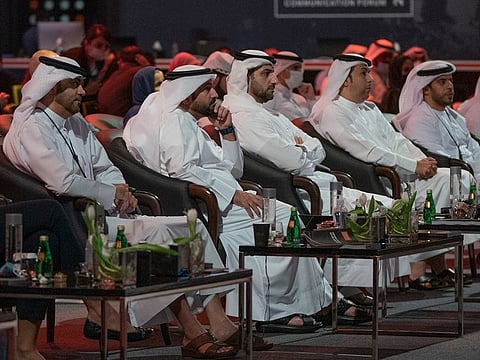UAE forum reveals proposal for content regulator in Arab world in wake of disruptive posts
Ministers at IGCF in Sharjah say governments have a role in checking some online posts

Also In This Package
Sharjah: Arab countries are working on setting up an online content regulatory authority, the 10th International Government Communication Forum (IGCF) in Sharjah heard on Monday.
Sakher Marwan Dudin, Jordan’s Minister of State for Media Affairs and spokesperson for Jordanian government, said the objective of the authority would be to prevent misinformation and misuse of words that are particularly associated with Arabs and Muslims.
He was responding to a question by moderator Sally Mousa during a session on ‘The future relevance of government communication tools: An assessment.’
Government accreditation
Omar Sultan Al Olama, UAE Minister of State for Artificial Intelligence, another speaker at the session, also felt that there should be a government platform to approve dissemination of critical news.
He was answering a question on how governments can balance the need for speed and crafting quality journalism by making sure that the information put out is accurate.
“It is very important for us to understand that quality comes first and speed next. You tend to misinform on some platforms [in a hurry to publish content],” he said.
Governments need to ensure the quality of content and give some sort of accreditation to verified news sources as they can affect political and social security, he added.
Increased awareness
However Al Olama had earlier clarified that he does not advocate extensive moderation, but increased awareness about regulating online content. He said internet users must be mindful that “every single click is recorded”.
Al Olama added: “We have reached a point where you talk about a topic to your friend on the phone and the next moment you see an ad related to it.” He said online platforms are able to give us content in a way they want based on our online activities.
Countering disruption
Al Olama cautioned that there are various dubious online methods including ‘deepfakes’ to provide content that seems to be correct but will cause disruption. However, Al Olama said hate speech or messages that force people into acts of violence will not be tolerated by any government.
“What is happening right now is we are changing from a world with a paradigm of speed to a world of tailored content,” he said, noting that people want content that they want to consume, which is why there is a massive migration of people from traditional media to social media and OTT platforms.
Al Olama added that governments should understand how to send information to the largest number of people through the optimal medium. “We need to start by first understanding things in terms of data, and then the platform and be wiser in sending [out the information].”
Ministers on board
Dudin, speaking about the propose online content regulatory authority, said Arab media ministers would be on board for the project. “We are about to establish an Arab content authority. Jordan is presiding over the Arab countries in this process,” he told the audience.
Dudin said a proposal for the same would be put forward to the Arab League in less than a month. “This is to safeguard the Arab League itself,” he pointed out.
Removing abusive content
Elaborating on the purpose, he said the authority would monitor the online content and implement a system through which abusive and derogatory content would be removed or blocked by using certain keywords. He gave examples of certain words considered sacred by Muslims in general, Arabs in particular.
“We as Arabs and Muslims, there are many words which we want to use properly. Some people misuse these words to do bad actions or evil deeds,” Dudin said.
Media awareness
He added that Jordan is also including media and information awareness in its curriculum.
“You are exposed to massive amounts of information, which, you don’t know, can be believed or not. How to sieve off the information received in different forms? Photoshop and other tools may be used and facts may be twisted to distort the content. That is why we want to protect our people with proper media education and awareness.”
Embracing new tools
Craig Oliver, principal of Teneo, a global CEO advisory forum, and former director of Politics and Communication under former British Prime Minister David Cameron, spoke about the need for governments to embrace new media for effective communication strategies.
Oliver, who had overhauled the British government communication by making it ready for the digital era, revealed that Cameron was initially sceptical about using Twitter for government communication, but later made effective use of the social media platform for communicating with people.
He said COVID-19 forced many governments to constantly communicate with the public through online platforms. Governments should enhance the skill of storytelling and the ability to connect with the audience in a way they are heard, he opined.
Meanwhile, another speaker, Toomas Hendrick Ilves, former president of Estonia from 2006 to 2016, explained how his country managed the early phase of the pandemic which forced people to stay home, thanks to the digital revolution and early adoption of e-governance.
Sign up for the Daily Briefing
Get the latest news and updates straight to your inbox








